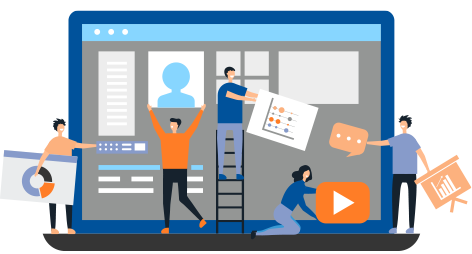What is a Content Management System (CMS)
Let ReachFarther help you decide which Content Management Site is best for you!

- A front-end or public-facing website. This is what shows up in Google searches and what your customers interact with. A single CMS may support multiple front-end websites.
- An administrative back-end. This portion of your CMS is closed to the public and requires some sort of authentication to prevent unauthorized access. It’s commonly referred to as your “admin site”. Logging into your admin site gives you control over the front-end as well as access to user accounts and other maintenance functions.
- A database. Your admin site will communicate with a database, which in turn will talk to your front-end website. The database holds the actual content for the website meaning the words, video files, images, URLs, etc. The specific type of database used varies by CMS, but they all pretty much do the same thing with varying degrees of speed, performance, and security.
- WYSIWYG Editing Capabilities (What you see is what you get) – The CMS gave non-technical employees the ability to scale their website and manage their content without the help of a developer or IT department. The front-end website, admin website, and database work in harmony to provide your team with an easy-to-use interface for managing your website without extensive knowledge of HTML or programming languages. And open source content management systems like WordPress also facilitate access to thousands of web plugins that further extend your ability to add complex website functionality with minimal effort.
Which CMS is Right for Your Business?
There are loads of content management systems on the market and different developers will push you in different directions depending on what they’re comfortable with and what their overall experience has been with different platforms. WordPress is far and away the world leader in terms of number of sites supported, which means there are thousands of WordPress developers in NJ who are capable of supporting your WordPress website, or performing monthly WordPress maintenance necessary to keep it running smoothly.
This is a very important factor in choosing the CMS that’s right for you because before working with ReachFarther, many of our customers found out the hard way that not all developers are created equal.
Factors to Consider When Choosing a CMS
Now that we’ve defined exactly what a content management system is and how it can benefit your business, let’s take a look at a few other factors that will shape your decision when investing in a new website with a CMS.
- Open Source vs. Proprietary – In terms of their structural platforms, content management systems fall into two primary buckets: proprietary and open source. Review our primer on the differences and benefits of the two platforms.
- Flexibility– You’re locked in for a few years, so research the CMS properly before committing. On average a company redesigns their website every three years, so choosing a CMS like WordPress makes use of WordPress Themes to quickly change the visual look and feel of a site may make sense. A theme will typically sit on top of your WordPress database and require less content migration during a redesign than some other platforms.
- Your Development Partner – Using the right design and development partner for your website or online campaign is very important to the success of any project. The right professionals are extremely important, and the wrong ones can lead to disaster. Choose a successful developer to guarantee a successful outcome.
- Ongoing Maintenance – A website is merely a collection of files and software sitting on an internet connected computer (a web server). Just like your home computer, the server and the website itself require maintenance, especially if you’ve chosen an open-source platform. This maintenance ensures that the most current security patches have been applied, that the most current operating system is in use, and that your programming language is up to date. Some proprietary content management systems may not require as much monthly maintenance as an open-source product, which could potentially lower your monthly costs.
- Hosting Cost – Content management systems run on many different platforms and each has its own features and limitations. WordPress for instance is hosted on a lamp stack and there are thousands of hosting companies that can support the product giving you a wide range of prices and features to choose from. Typically, open-source products are cheaper to host and proprietary systems unless the latter scales to a degree that enables the host to cut costs, like the SaaS products in use today.
Do you have questions about how a CMS can help your business?
Our web design professionals from Chicago or our web developers in Mendham can help explain things for you. Believe it or not we still use our telephones and will gladly talk with you to explain how we can help. And if we can’t, we’ll try to get you to someone who can.